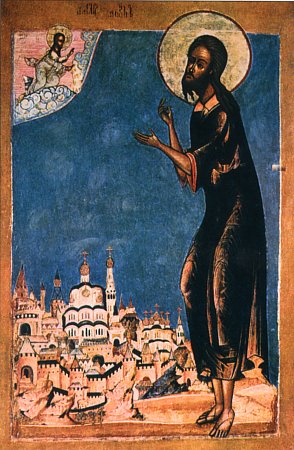| ST. ALEXIUS or Alexis is a perfect model of the most generous contempt of the world. He was the only son of a rich senator of Rome, born and educated in that capital, in the fifth century. From the charitable example of his pious parents he learned, from his tender years, that the riches which are given away to the poor, remain with us for ever; and that alms-deeds are a treasure transferred to heaven, with the interest of an immense reward. And whilst yet a child, not content to give all he could, he left nothing unattempted to compass or solicit the relief of all whom he saw in distress. But the manner in which he dealt about his liberal alms was still a greater proof of the noble sentiments of virtue with which his soul was fired; for by this he showed that he thought himself most obliged to those who received his charity, and regarded them as his greatest benefactors. The more he enlarged his views of eternity, and raised his thoughts and desires to the bright scene of immortal bliss, the more did he daily despise all earthly toys; for, when once the soul is thus upon the wing, and soars upwards, how does the glory of this world lessen in her eye! and how does she contemn the empty pageantry of all that worldlings call great! | 1 |
| Fearing lest the fascination, or at least the distraction of temporal honours might at length divide or draw his heart too much from those only noble and great objects, he entertained thoughts of renouncing the advantages of his birth, and retiring from the more dangerous part of the world. Having, in compliance with the will of his parents, married a rich and virtuous lady, he on the very day of the nuptials, making use of the liberty which the laws of God and his church give a person before the marriage be consummated, of preferring a more perfect state, secretly withdrew, in order to break all the ties which held him in the world. In disguise he travelled into a distant country, embraced extreme poverty, and resided in a hut adjoining to a church dedicated to the Mother of God. Being, after some time there, discovered to be a stranger of distinction, he returned home, and being received as a poor pilgrim, lived some time unknown in his father’s house, bearing the contumely and ill treatment of the servants with invincible patience and silence. A little before he died, he by a letter discovered himself to his parents. He flourished in the reign of the emperor Honorius, Innocent the First being bishop of Rome; and is honoured in the calendars of the Latins, Greeks, Syrians, Maronites, and Armenians. His interment was celebrated with the greatest pomp by the whole city of Rome, on the Aventin hill. His body was found there in 1216, in the ancient church of St. Boniface, whilst Honorius III. sat in St. Peter’s chair, and at this day is the most precious treasure of a sumptuous church on the same spot, which bears his name jointly with that of St. Boniface, gives title to a cardinal, and is in the hands of the Hieronymites. | 2 |
| The extraordinary paths in which the Holy Ghost is pleased sometimes to conduct certain privileged souls are rather to be admired than imitated. If it cost them so much to seek humiliations, how diligently ought we to make a good use of those at least which providence sends us! It is only by humbling ourselves on all occasions that we can walk in the path of true humility, and root out of our hearts all secret pride. The poison of this vice infects all states and conditions: it often lurks undiscovered in the foldings of the heart even after a man has got the mastery over all his other passions. Pride always remains even for the most perfect principally to fight against; and unless we watch continually against it, nothing will remain sound or untainted in our lives; this vice will creep even into our best actions, infect the whole circle of our lives, and become a main spring of all the motions of our heart; and what is the height of our misfortune, the deeper its wounds are, the more is the soul stupified by its venom, and the less capable is she of feeling her most grievous disease and spiritual death. St. John Climacus writes, 1 that when a young novice was rebuked for his pride, he said: “Pardon me, father, I am not proud.” To whom the experienced director replied: “And how could you give me a surer proof of your pride than by not seeing it yourself?” | 3 |

No comments:
Post a Comment
Comments are subject to deletion if they are not germane. I have no problem with a bit of colourful language, but blasphemy or depraved profanity will not be allowed. Attacks on the Catholic Faith will not be tolerated. Comments will be deleted that are republican (Yanks! Note the lower case 'r'!), attacks on the legitimacy of Pope Leo XIV as the Vicar of Christ, the legitimacy of the House of Windsor or of the claims of the Elder Line of the House of France, or attacks on the legitimacy of any of the currently ruling Houses of Europe.